Bahçeşehir University (BAU) actively collaborates with government institutions, intergovernmental bodies, and non-governmental organizations (NGOs) to support the formulation, implementation, and monitoring of Sustainable Development Goal (SDG) policies at local, national, and international levels.
Through these partnerships, BAU contributes research-based expertise, policy analysis, and capacity-building initiatives that help shape evidence-driven strategies addressing social, economic, and environmental challenges.
The University’s engagement includes joint projects, advisory roles, and data-sharing collaborations designed to align policy development with the SDGs.
By maintaining continuous dialogue with governmental and non-governmental stakeholders, BAU ensures that its academic and research outputs directly inform policy frameworks, strategic planning, and institutional decision-making.
Examples of BAU’s partnerships and policy-oriented initiatives with governments and NGOs and projects are presented in the following section.
1.Collaborating for Change: Policy, Innovation, and Capacity Building in the Bahcesehir University–FAO Partnership
The images below show Bahcesehir University’s partnership with the Food and Agriculture Organization (FAO), including a screenshot from the FAO website and the signing of the FAO–BAU Memorandum of Understanding (MoU)
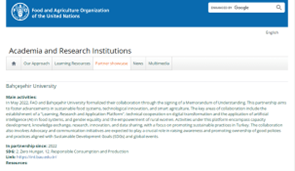
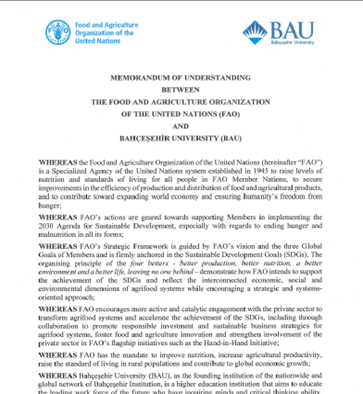
Since May 2022, Bahçeşehir University (BAU) and the Food and Agriculture Organization of the United Nations (FAO) have been collaborating to advance sustainable food systems, smart agriculture, and policy development in alignment with the UN Sustainable Development Goals (SDGs).
Formalized through a Memorandum of Understanding (MoU), the partnership focuses on creating a Learning, Research, and Application Platform that fosters innovation, knowledge sharing, and capacity development in the areas of digital transformation, artificial intelligence (AI), and sustainable agriculture.
The cooperation extends to key strategic areas identified in the MoU, including:
Since 2022, BAU and FAO have jointly organized policy-oriented workshops, seminars, and public events addressing water management, sustainable agriculture, and food security. These initiatives provide a platform for dialogue among academia, policymakers, and industry stakeholders, supporting evidence-based decision-making and the development of effective national and regional strategies.
Through this ongoing collaboration, Bahçeşehir University contributes to shaping inclusive, technology-driven, and gender-sensitive agricultural policies, reinforcing its role as an academic partner committed to sustainability, innovation, and public policy advancement.
2.Bahçeşehir University and UNESCO: Advancing Inclusive Sustainability trough Project Aladdin: Towards Environmental, Social, and Economic Sustainability: Challenges and Solutions
The images below show the poster and program flow of the 2024 Project Aladdin policy oriented event jointly organized by Bahcesehir University and UNESCO.
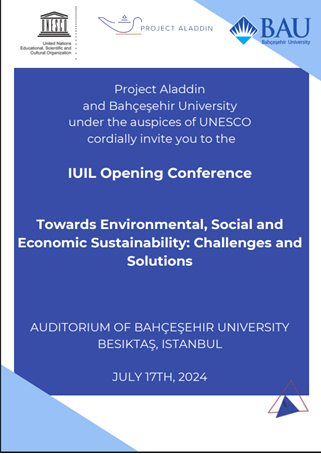
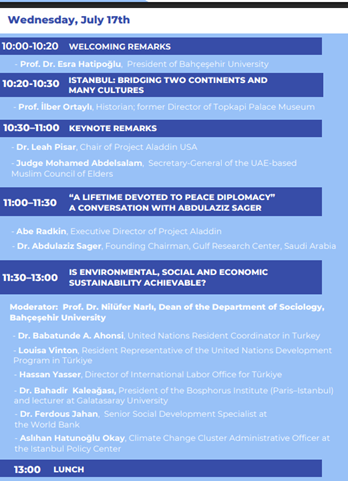
Since 2013, Bahçeşehir University (BAU) has been a proud partner of Project Aladdin, under the auspices of UNESCO, co-organizing the International University for Intercultural Leadership (IUIL) — a global platform bringing together academics, policymakers and students from more than 60 universities across Europe, the Middle East, Africa, Asia, and the Americas.
In 2024, the IUIL was hosted by Bahcesehir University in Istanbul, focusing on “Towards Environmental, Social, and Economic Sustainability: Challenges and Solutions.” The program explored sustainable development through a multidisciplinary and intercultural approach, addressing climate resilience, women’s empowerment, and social justice as central themes. Participants engaged in lectures, workshops, and field research on sustainability policies, inclusive growth, and environmental governance, guided by experts from the UN, UNDP, World Bank, and academia.
Through this initiative, BAU strengthened its role as a regional hub for sustainability dialogue, contributing to the design of innovative solutions and policy frameworks that support the UN Sustainable Development Goals (SDGs) — particularly SDG 5 (Gender Equality), SDG 10 (Reduced Inequalities), and SDG 13 (Climate Action). The collaboration also enhances intercultural leadership skills and fosters international cooperation toward a more equitable and resilient future.
The image below shows event photo from the opening day of the 2024 conference ‘Advancing Inclusive Sustainability: Challenges and Solutions,’ co-organized by Bahcesehir University and UNESCO under Project Aladdin.
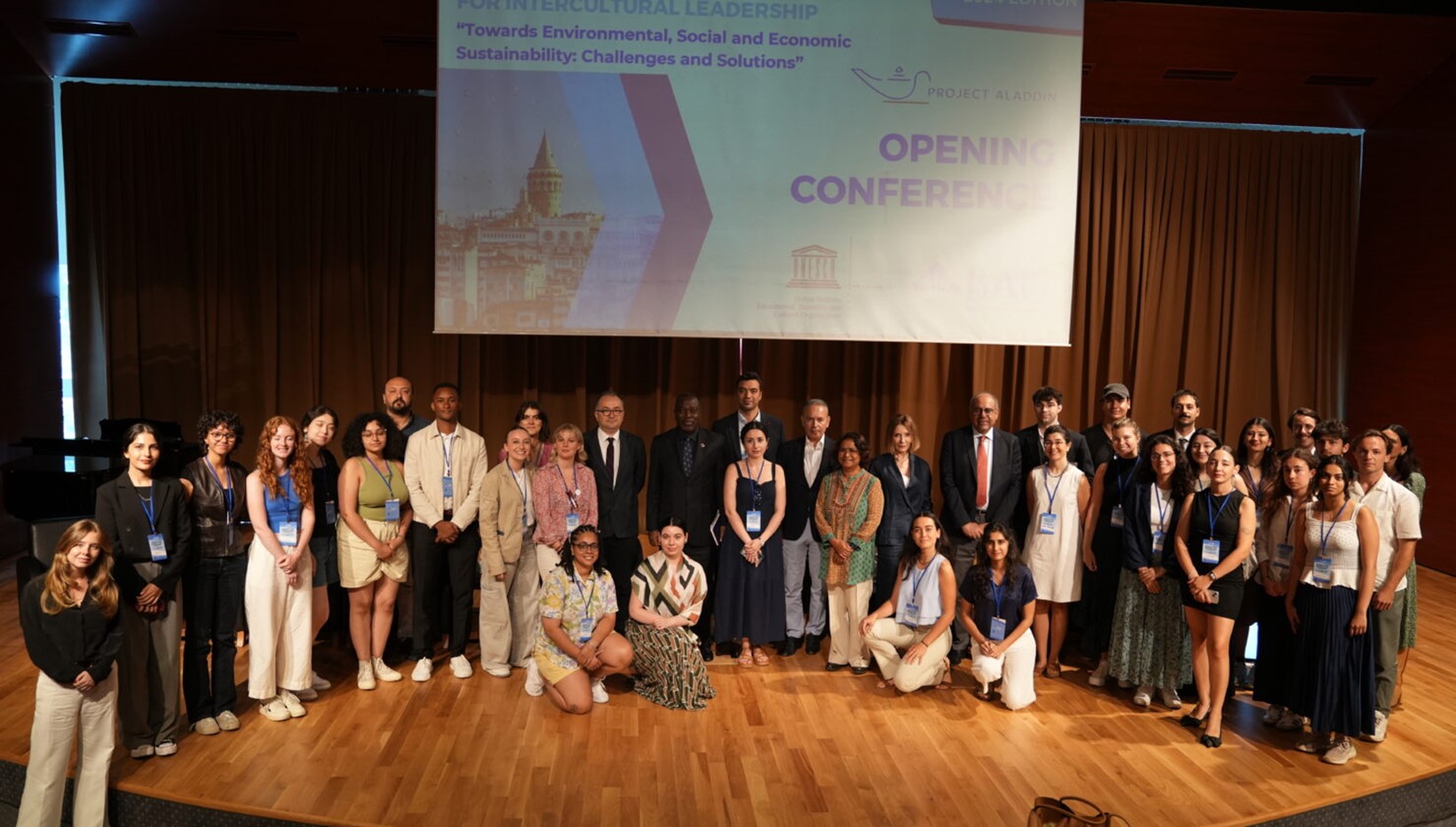
3-Roundtable with Civil Society: “Towards COP29 – Evaluating Challenges, Solutions, and Policy Pathways for Climate Action in Turkey”
The image below shows the promotional poster of the roundtable ‘Towards COP29 – Evaluating Challenges, Solutions, and Policy Pathways for Climate Action in Turkey,’ co-organized by Bahcesehir University, CIFAL Istanbul, UNITAR and NGOs.
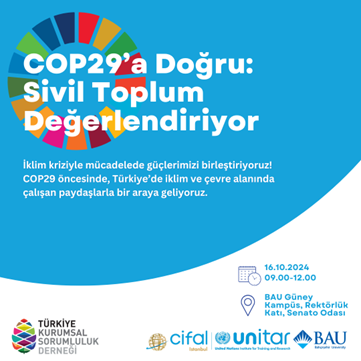
On October 16, 2024, Bahçeşehir – Bahcesehir University - University and CIFAL Istanbul (UNITAR), in collaboration with the Corporate Social Responsibility Association of Turkey (CSR Turkey) and several leading environmental NGOs, jointly organized a high-level roundtable titled “Towards COP29: Civil Society Evaluates.” The meeting brought together several civil society representatives, academics, and policy experts to assess Turkey’s environmental and climate change agenda in the post-COP28 period and to contribute to the formation of national strategies ahead of COP29.
The roundtable provided a crucial policy dialogue platform where participants discussed the role of civil society in advancing climate action, the transition to renewable energy, and the integration of sustainability into national development frameworks. Expert contributions by Özlem Katısöz, Climate and Energy Policy Coordinator at CAN Europe, and Barış Doğru, Editor-in-Chief of EkoIQ, offered analytical insights into Turkey’s evolving climate policy landscape, highlighting both progress and challenges in meeting international commitments.
Through this dialogue, participants collectively emphasized the need for a realistic roadmap toward reducing dependence on fossil fuels and expanding renewable energy investments. The event concluded with a shared commitment to strengthen cooperation between academia, civil society, and the private sector—a key step in supporting evidence-based policymaking and inclusive climate governance.
By fostering informed discussion and cross-sector collaboration, the roundtable directly contributes to SDG 13 (Climate Action) by advancing national policy development and raising awareness on climate resilience, while also supporting SDG 17 (Partnerships for the Goals) through its multi-stakeholder approach to sustainable environmental governance.
The image below shows event photo from the roundtable ‘Towards COP29 – Evaluating Challenges, Solutions, and Policy Pathways for Climate Action in Turkey,’ featuring participants from academia, NGOs, and civil society organizations.
.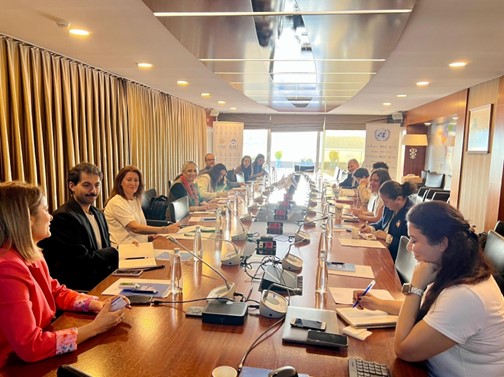
4.BAU National Policy Forum on Artificial Intelligence and Technology in Hazelnut Farming with Ministry of Agriculture and Forestry, the Eastern Black Sea Development Agency
The image below shows the promotional poster of the BAU National Policy Forum on Artificial Intelligence and Technology in Hazelnut Farming, co-organized by Bahcesehir University, the Ministry of Agriculture and Forestry, and the Eastern Black Sea Development Agency.
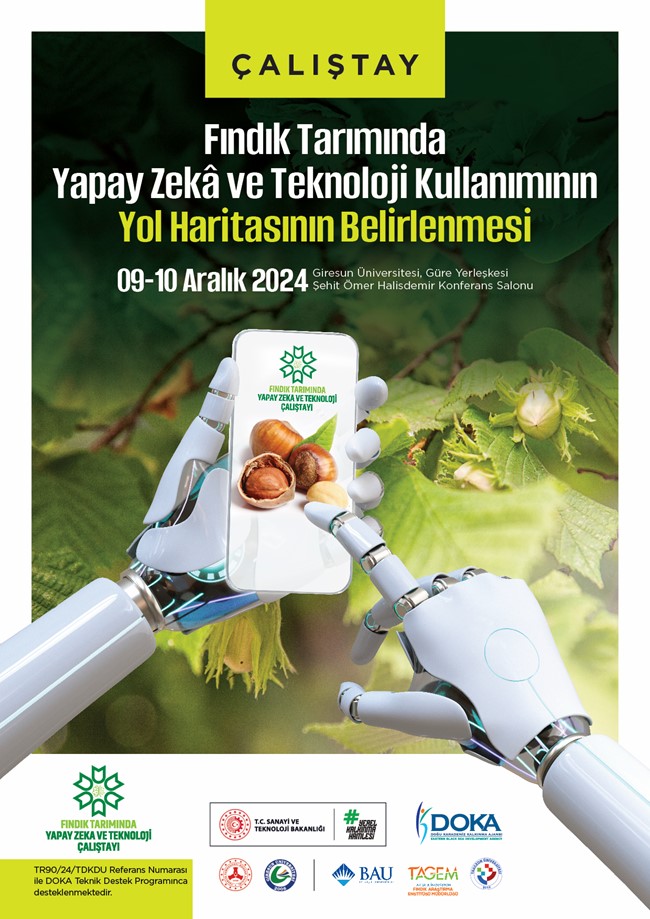
The National Policy Forum on Artificial Intelligence and Technology in Hazelnut Farming, held in Giresun in December 2024, was organized under the coordination of the Ministry of Agriculture and Forestry and the Giresun Governorship, with the support of Bahçeşehir University – Bahcesehir University - (BAU), Giresun University, the Eastern Black Sea Development Agency (DOKA), and several other public, academic, and private sector stakeholders.
The forum brought together government representatives, universities, research institutions, industry leaders, and farmer organizations to develop a national policy roadmap for integrating artificial intelligence (AI) and digital technologies into Turkey’s agricultural production systems, particularly in the hazelnut sector, which plays a strategic role in the country’s economy.
The University contributed to the forum through its expertise in AI applications, sustainable food systems, and policy research, supporting the formulation of data-driven agricultural strategies, evidence-based policy recommendations, and innovation-oriented frameworks.
By connecting national and local institutions, the initiative promotes the digital transformation of agriculture and strengthens Turkey’s commitment to the UN Sustainable Development Goals (SDGs)—especially SDG 2 (Zero Hunger), SDG 1 (No Poverty), SDG 9 (Industry, Innovation, and Infrastructure), and SDG 13 (Climate Action)—advancing inclusive, climate-smart, and technology-driven agricultural development.
The images below show event photos from the BAU National Policy Forum on Artificial Intelligence and Technology in Hazelnut Farming, featuring representatives from Bahcesehir University, the Ministry of Agriculture and Forestry, the Eastern Black Sea Development Agency, and other stakeholders


5.Special Session at COP29: Bahçeşehir University and United Nations Institute for Training and Research (UNITAR)- Advancing Climate Policy, Education, and Global Best Practices
The image below shows the promotional poster of the Special Session at COP29, co-organized by Bahcesehir University and the United Nations Institute for Training and Research (UNITAR).
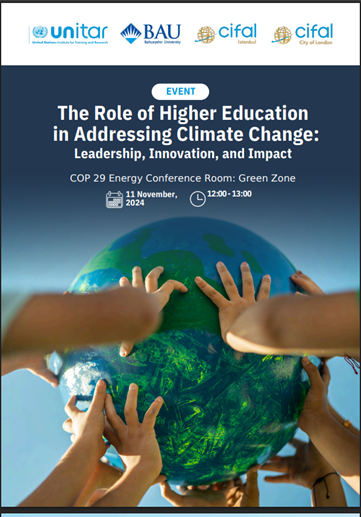
On November 11, 2024, during the United Nations Climate Change Conference (COP29) in Baku, Azerbaijan, a landmark session titled “The Role of Higher Education in Addressing Climate Change: Leadership, Innovation, and Impact” was co-organized by UNITAR, CIFAL Istanbul, Bahçeşehir University (Bahcesehir University) and CIFAL City of London. Marking the first time a Turkish university hosted an independent session at COP, this event positioned Bahçeşehir University as a key contributor to global climate dialogue and higher education’s policy impact.
The session convened academic leaders, policymakers, and sustainability experts to explore how universities can shape climate solutions through research, education, and innovation.
Discussions focused on embedding climate literacy across curricula, promoting interdisciplinary collaboration, and developing science-based strategies for resilience and adaptation. Participants emphasized that universities play a pivotal role not only in knowledge generation, but also in influencing national and international climate policy through research-driven insights and stakeholder engagement.
In alignment with UNITAR’s global learning objectives, the session highlighted best practices and comparative approaches to integrating climate change education into higher education, fostering capacity-building initiatives for young leaders, educators, and decision-makers.
Expected outcomes included the creation of cross-regional networks between universities, NGOs, and government institutions; the sharing of case studies and innovative models; and the development of policy frameworks to accelerate sustainable transformation.
Representing Turkey’s academic leadership on the global stage, Prof. Dr. Esra Hatipoğlu, Rector of Bahcesehir (Bahçeşehir) University, and Prof. Dr. Çisil Sohodol, Director of CIFAL Istanbul, shared the institution’s experience in advancing sustainability-centered education and community partnerships.
The session was moderated by Dr. Ebru Canan-Sokullu, Associate Director at the CIFAL Global Network (UNITAR), who underscored the importance of university–organization cooperation in shaping effective climate governance frameworks.
By integrating education, research, policy development, and international best practice exchange, this pioneering COP29 special session exemplified Bahçeşehir University’s leadership in sustainable transformation.
It reinforced the University’s commitment to SDG 13 (Climate Action) through policy engagement, SDG 4 (Quality Education) by promoting climate literacy and capacity-building, and SDG 17 (Partnerships for the Goals) through international collaboration, best practice exchange, and global climate resilience.
The images below show event photos from the Special Session at COP29 jointly organized by Bahcesehir University and UNITAR, featuring speakers and participants engaging in discussions on climate policy and education.
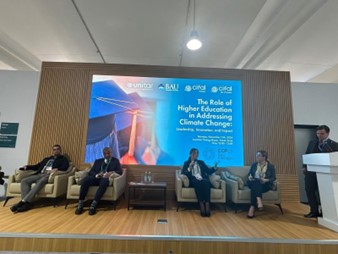
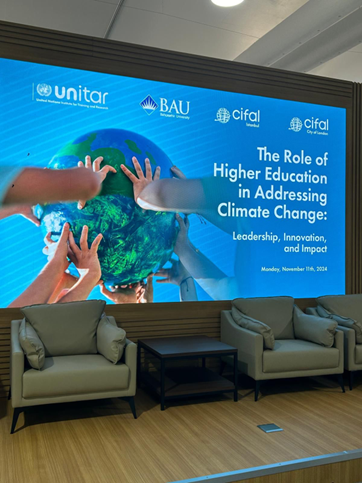
6.Bahçeşehir University’s Engagement in the Impact Investing Advisory Board (EYDK): Strengthening Policy and Strategy Development in Sustainable Finance
The image below shows a screenshot from the official website of the Impact Investing Advisory Board (EYDK), indicating Bahcesehir University’s membership and engagement in sustainable finance policy development.
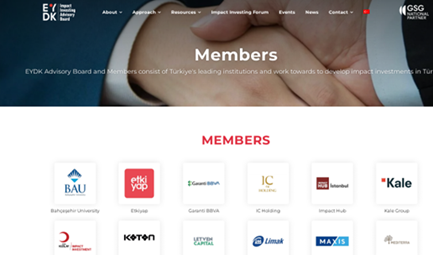
The Impact Investing Advisory Board (EYDK) was founded in April 2019 to function as a national high-level platform and NGO for identifying priorities, shaping strategies, and formulating policy recommendations that advance the development of impact investment in Turkey. Following its formal establishment, EYDK rapidly began operations, engaging public institutions, academia, the private sector, and civil society in a coordinated effort to strengthen the national impact investment ecosystem.
Through these multi-stakeholder collaborations, EYDK has produced inclusive, data-driven policy reports, and achieved substantial progress in areas such as policy development, market expansion, ecosystem communication, and strategic research, all aligned with Turkey’s sustainable development priorities.
In March 2022, EYDK joined the Global Steering Group for Impact Investment (GSG), becoming part of the global impact investment policy network. This membership strengthened Turkey’s position in international sustainable finance discussions and enabled the transfer of global policy insights to national strategy frameworks.
Bahçeşehir University (BAU) became an active institutional stakeholder within EYDK, contributing to policy formulation, strategy design, and advocacy processes related to impact investing. Through academic expertise, research, and capacity-building initiatives, BAU supports the integration of impact-driven investment principles into national policies and promotes sustainable development through evidence-based policymaking.
By participating in EYDK, Bahçeşehir University reinforces its commitment to bridging academia, government, and industry, fostering a policy environment that encourages inclusive growth, responsible investment, and long-term social impact.
7.Advancing Policy Pathways for Sustainable Food and Land Systems: Bahçeşehir University and NGOs within the FABLE Consortium
The image below shows a screenshot from the official website of the FABLE Consortium, indicating Bahcesehir University’s membership and collaboration with NGOs in advancing policy pathways for sustainable food and land systems.
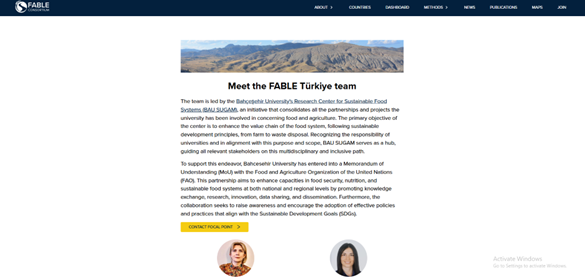
Bahcesehir – Bahçeşehir - University serves as the Turkish partner of the global FABLE Consortium (Food, Agriculture, Biodiversity, Land-Use, and Energy), a network of research institutions and NGOs dedicated to developing nationally coherent and globally aligned pathways for achieving the Sustainable Development Goals (SDGs) and the Paris Climate Agreement targets.
Within this framework, country teams work to design bottom-up policy pathways for sustainable food and land-use systems and engage directly with national governments to promote data-driven and ambitious sustainability policies. The FABLE Secretariat is jointly led by the Sustainable Development Solutions Network (SDSN), the International Institute for Applied Systems Analysis (IIASA), and the Alliance of Bioversity International and CIAT:
In Turkey, the initiative is led by the BAU Research Center for Sustainable Food Systems (BAU SUGAM), which consolidates all of the University’s partnerships and research efforts related to food, agriculture, and sustainability policy. Through research, data modeling, and policy analysis, BAU contributes to defining science-based policy recommendations, supporting national strategies on food security, climate action, and sustainable rural development:
By linking academia, civil society, and government, Bahçeşehir University strengthens the national capacity for evidence-based decision-making and contributes directly to global policy dialogues on sustainable development.
8.BAU– United Nations Institute for Training and Research (UNITAR). Collaboration through CIFAL Istanbul for SDG Policy Development and International Cooperation
The image below shows the signing of the Memorandum of Understanding (MoU) between Bahcesehir University and the United Nations Institute for Training and Research (UNITAR).
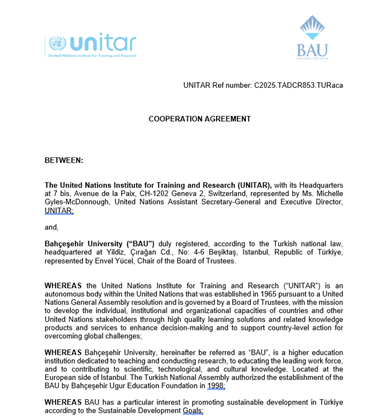
Bahçeşehir University (BAU) serves as the institutional host of CIFAL Istanbul, the International Training Centre for Authorities and Leaders, established in partnership with the United Nations Institute for Training and Research (UNITAR).
CIFAL Istanbul is part of the UNITAR Global CIFAL Network, a worldwide framework dedicated to capacity development, policy dialogue, and SDG-oriented training for government officials, policymakers, and local leaders.
Under the renewed Cooperation Agreement (2023–2025), BAU and UNITAR jointly design, implement, and evaluate programs that directly contribute to national and regional SDG policy development.
These activities include identifying systemic challenges, developing strategies for sustainable governance, modelling future policy scenarios, and monitoring the implementation of SDG-related interventions at local and regional levels.
Through CIFAL Istanbul, BAU engages in international collaboration and research that strengthens Turkey’s and the broader Eastern European and MENA regions’ capacity to integrate the Sustainable Development Goals (SDGs) into policy and institutional frameworks.
Training and research programs focus on economic development, social inclusion, climate action, and digital transformation, with the goal of fostering data-driven policymaking and adaptive management practices across different levels of governance.
CIFAL Istanbul’s annual programs — comprising workshops, seminars, e-learning, and blended courses — reach local and national authorities, civil society representatives, international organizations, and private sector actors, creating a neutral platform for SDG-focused dialogue and knowledge exchange.
The Centre’s work contributes to advancing SDG 17 (Partnerships for the Goals) by strengthening international cooperation for sustainable development; SDG 16 (Peace, Justice and Strong Institutions) by improving governance capacities; and cross-cuttingly supports SDGs 4, 8, 11, and 13 through education, innovation, and climate-oriented policy learning.
Through this sustained partnership with the United Nations, Bahçeşehir University not only contributes to policy development and monitoring mechanisms for the SDGs, but also promotes international best practices, comparative research, and collaborative governance — positioning CIFAL Istanbul as a regional hub of excellence for sustainable development capacity-building and evidence-based policy support.
9.BAU Rotary Peace Center – A Neutral Platform for Peacebuilding and Policy Development in the MENA Region
The image below shows a screenshot from the official Rotary International website indicating that Bahcesehir University hosts a Rotary Peace Center, serving as a neutral platform for peacebuilding and policy development in the MENA region.

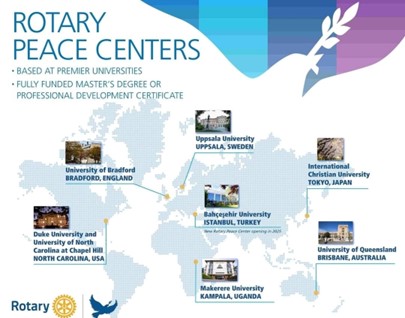
Since 2023, Bahceşehir University (BAU) has been the only university in Turkey to host the Otto & Fran Walter Rotary Peace Center, serving the Middle East and North Africa (MENA) region in partnership with CIFAL Istanbul, which operates under the United Nations Institute for Training and Research (UNITAR).
This collaboration positions BAU as a regional hub for peace education, dialogue, policy innovation, and policy development, combining academic excellence with practical field engagement.
The BAU Rotary Peace Center was established with the mission of enhancing human capacity for conflict resolution, peacebuilding, and sustainable development. It provides a safe, neutral, and academically guided environment where individuals from diverse cultural, political, and professional backgrounds come together to exchange ideas, share experiences, and collaborate on solutions to regional and global challenges.
As a platform grounded in impartiality and inclusion, the Center embodies BAU’s commitment to fostering open and evidence-based dialogue, ensuring that participants can engage in frank discussions free from political or institutional bias.
Each year, the Peace Center welcomes fellows and professionals from governments, NGOs, academia, and international organizations across the MENA region. The program combines academic coursework, seminars, workshops, and field-based projects, enabling participants to translate theoretical knowledge into practical action. The curriculum emphasizes themes such as peacebuilding, conflict transformation, humanitarian diplomacy, migration, climate resilience, and community development, reflecting the interconnected nature of today’s global challenges.
The BAU Rotary Peace Center operates as part of Rotary International’s global network of peace centers, linking BAU to a worldwide community of practitioners, researchers, and institutions dedicated to advancing peace and human security.
Its academic program, conducted in English, is hosted at BAU’s Future Campus in Istanbul, providing a multicultural environment that mirrors the diversity of the region it serves.
By hosting this Center, BAU strengthens its role as a trusted convener and facilitator of dialogue among actors with differing perspectives.
The initiative directly supports the University’s vision of serving as a neutral platform for inclusive discussion and policy development, where academic expertise informs policy practice and mutual understanding.
Through this work, BAU contributes meaningfully to Sustainable Development Goal 16 (Peace, Justice and Strong Institutions) and Goal 17 (Partnerships for the Goals) — promoting good governance, cooperation, and lasting peace through education and collaboration.
10.Bahçeşehir University as a Member of the Agroecology Coalition for Transforming Global Food Systems
The image below shows a screenshot from the official website of the Agroecology Coalition, indicating Bahcesehir University’s membership in the global initiative for transforming food systems.
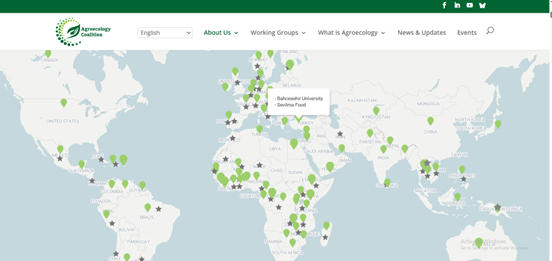
The interconnected crises in food, climate, and biodiversity have created an urgent need for transformative, cross-sectoral action. Recognizing this global imperative, Bahçeşehir University (BAU) joined the Agroecology Coalition, a United Nations–supported global initiative established in the wake of the 2021 United Nations Food Systems Summit (UNFSS) to advance the transformation of food systems through agroecology.
The Coalition was created to provide a collaborative mechanism for countries, academic institutions, and organizations to address multiple challenges simultaneously—ensuring sustainable food production, ecosystem restoration, and climate resilience. Its work is guided by the 13 Principles of Agroecology defined by the High-Level Panel of Experts for Food Security and Nutrition (HLPE-FSN) under the Committee on World Food Security (CFS), aligned with the 10 Elements of Agroecology adopted by the FAO Council in 2019.
Today, the Agroecology Coalition serves as a key global voice for science-based policy dialogue and the implementation of sustainable food systems, bringing together more than 300 members from governments, academia, NGOs, and international organizations.
Its mission is structured around five workstreams:
Bahçeşehir University is an official member of the Coalition and contributes actively to several working groups, including those on Policies, Research, Innovation and Education, and Implementation.
Within these platforms, BAU provides expert insight, contributes to the formulation of international policy frameworks, and engages in research-driven collaboration aimed at scaling up agroecological practices and integrating sustainability principles into national and regional strategies.
Through this participation, BAU supports the development and dissemination of international best practices for sustainable food systems, bridging academic research with policy action.
Its role within the Agroecology Coalition strengthens the University’s contribution to SDG 2 (Zero Hunger) — advancing food security through sustainable agriculture, SDG 13 (Climate Action) — promoting ecosystem-based approaches to climate resilience; and SDG 17 (Partnerships for the Goals) — fostering international cooperation for systemic transformation.
By working alongside global partners, Bahçeşehir University continues to shape the global discourse on agroecological policy development, supporting the creation of evidence-based, inclusive, and resilient food systems for future generations.
11.BAU SDGs and Beyond: Women’s Leadership and Sustainable Development
The image below shows the promotional poster of the event ‘BAU SDGs and Beyond: Women’s Leadership and Sustainable Development,’ organized by Bahcesehir University and TÜLIP Sustainability Center.
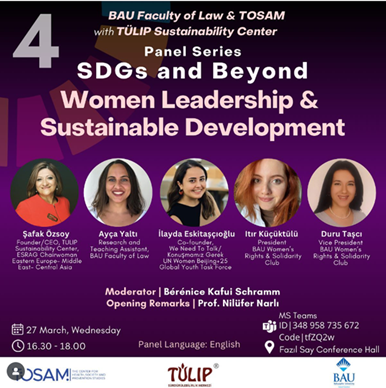
On 27 March 2024, Bahcesehir University (BAU), in collaboration with the TÜLIP Sustainability Center and TOSAM (Center for Health, Society, Behavior, and Prevention Studies), co-organized the fourth session of the SDGs and Beyond public lecture series, titled “Women’s Leadership and Sustainable Development.”
The hybrid panel brought together women leaders, policymakers, academics, and professionals to discuss how women’s leadership contributes to shaping inclusive and sustainable policies across sectors.
Moderated by Bérénice Kafui Schramm and opened by Prof. Nilüfer Narlı, the event explored key themes such as empowerment, youth leadership, health equity, and inclusive governance, emphasizing the policy relevance of gender equality as a driver of sustainable development.
By fostering an open and collaborative space for dialogue among stakeholders, the event not only promoted knowledge exchange and social awareness but also contributed to policy formulation and evidence-based decision-making in line with the United Nations Sustainable Development Goals.
The initiative directly advanced SDG 5 (Gender Equality), SDG 10 (Reduced Inequalities), and SDG 16 (Peace, Justice and Strong Institutions), reinforcing BAU’s commitment to inclusive governance, equality, and participatory policy development.
12.BAU Hosts the Single Mothers Conference in Collaboration with the Single Mothers Association and BAUEqual
The image below shows the promotional poster of the Single Mothers Conference hosted by Bahcesehir University in collaboration with the Single Mothers Association and BAUEqual.
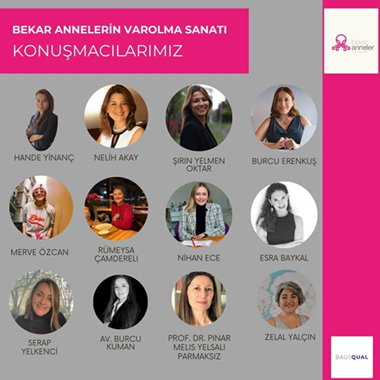
On 21 March 2024, Bahçeşehir University (BAU), in collaboration with the Single Mothers Association and with the support of BAUEqual, organized the Single Mothers Conference to address the growing social and economic challenges faced by single mothers in Turkey and around the world.
The event served as a multi-stakeholder policy dialogue platform, exploring the social, legal, and economic dimensions of single motherhood. Discussions covered issues such as legal rights, societal perceptions, employment barriers, and access to public and local government support systems.
Experts, policymakers, and academics from various disciplines shared insights into national and international policy frameworks that influence the lives of single mothers, identifying both structural obstacles and opportunities for empowerment.
By facilitating evidence-based discussion and collaborative engagement, BAU contributed to shaping inclusive policies and enhancing awareness around gender-sensitive social welfare strategies.
This initiative directly advanced SDG 5 (Gender Equality) by promoting women’s empowerment and inclusion, while also supporting SDG 8 (Decent Work and Economic Growth), SDG 10 (Reduced Inequalities), and SDG 16 (Peace, Justice and Strong Institutions) through its emphasis on rights-based policymaking, social innovation, and equitable development.